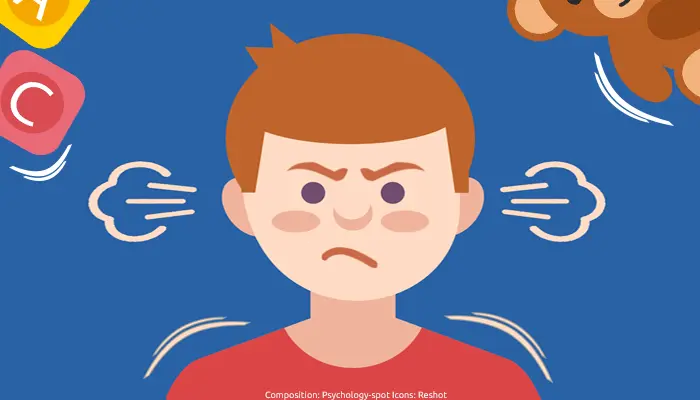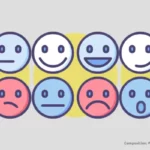
No parent looks forward to their child’s next tantrum. No parent also likes it when their little one gets angry, upset or irritated. It is normal. However, instead of telling him, “You shouldn’t get angry,” it is better to take advantage of that situation and turn it into a learning opportunity to teach your child to better manage his emotions, a skill he will need later in life to be happy, successful and build healthy relationships.
Anger in children
Have you ever wondered what anger is for? Anger gets a very bad press because we tend to perceive it as a terrifying, destructive, and unwanted emotion. However, anger has adaptive functions, like the rest of the emotions.
It sharpens our attention, helps us to be more attentive to the environment and act quickly, in addition to energizing our behavior and even pushing us to be more perseverant in achieving our objectives, as revealed by a study carried out at the University of Texas.
Anger can also act as a moral compass since it is activated when we first experience or witness a situation that goes against our values, encouraging us to defend and fight for what we believe is right.
Therefore, telling your child that he should not get angry means invalidating a part of his emotional universe and denying what he feels. In this way, the child only learns to repress his emotions because he realizes that they are not socially accepted. Instead of learning to manage and express them assertively, he hides them or even becomes ashamed of them, so in the long run he will end up losing contact with his emotional world.
3 keys to teaching children to manage anger
As a basic emotion, anger in response to blocked goals arises very early in children’s development. Some psychologists have detected it in babies as young as 4 months old and explain that it usually increases during the first years of life, especially as the little ones gain mobility and parents are forced to exercise more control and establish limits that frustrate to the kids.
However, when managed properly, children’s anger and irritability subside. Unfortunately, in cases where it is not channeled correctly from an early age, it often leads to internalized emotional conflicts or behavioral problems later in childhood, according to a study conducted at Pennsylvania State University.
In a general sense, all parents should be aware that teaching their children to effectively regulate emotions, especially the most intense ones such as anger and sadness, helps them develop greater emotional granularity and self-control, which will be essential for their well-being and relationships later in life. How to achieve it?
1. Draw clear boundaries
Children need to feel that their parents listen to them and understand them. They should know that the intense and “negative” emotions they experience are perfectly normal and that their parents are by their side to help them manage them.
Obviously, accepting an emotion like anger doesn’t mean normalizing aggression or the harmful behaviors it might trigger, like yelling or hitting someone. To avoid these behaviors, it is better to draw clear limits. Children should know that they can get angry, but that is not a reason to yell, throw things or hit them because there are more assertive ways to express that anger.
2. Teach him to express his emotions with words
The more a child can talk about his emotions, the less he will need to express them physically. Therefore, help him recognize what he feels and label what he experiences. Encourage him to talk about what has made him angry or irritated.
This way you will not only be able to better understand its causes, but also look for solutions. Ask him what he thinks would help him feel better. You can also use resources such as books to control anger in children, which are particularly effective in helping them better understand and channel what they feel by identifying with characters who are experiencing situations similar to theirs.
3. Provide physical outlets
Anger is an emotion that drives action, so sometimes words are not enough, especially when it comes to younger children who do not yet have enough brain maturity to implement self-control. In those cases, it is advisable that you give your child assertive ways to release that anger.
It can be through drawing, but also playing with a ball or through sports. The key is to allow yourself to physically release that pent-up energy safely, without harming yourself or others or your environment. There are also very fun and effective relaxation techniques for children that you can teach them to practice in those moments when they feel like they are about to lose their cool.
Don’t respond to anger with more anger
In any case, the best way to teach a child how to manage anger is to become his role model. If your child notices that you explode at the first opportunity, that you are not able to deal assertively with your frustration, and that the slightest setback sets you off, he will learn that these responses are normal.
Yelling at children can have lasting negative effects on their self-esteem and emotional development. And remember that even if you don’t show your anger, the little ones can feel it. So, take a step back, take a deep breath, and calm down.
In the end, it all comes down to the messages we send and the way we ourselves manage anger. Stop before you explode so you can regain self-control. And if one day you get angry – something perfectly normal because we are not Zen monks – apologize for your outburst and try not to let it happen again.
References:
Lench, H. C. et. Al. (2023) Anger Has Benefits for Attaining Goals Heather. J Pers Soc Psychol; 10.1037: 1-16.
Liu, C. et. Al. (2018) Developmental Patterns of Anger from Infancy to Middle Childhood Predict Problem Behaviors at Age 8. Dev Psychol; 54(11): 2090–2100.




Leave a Reply